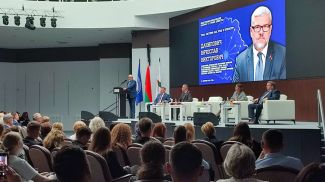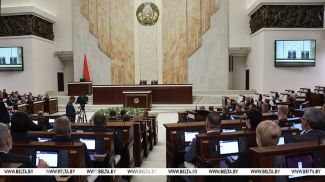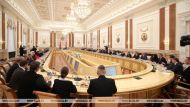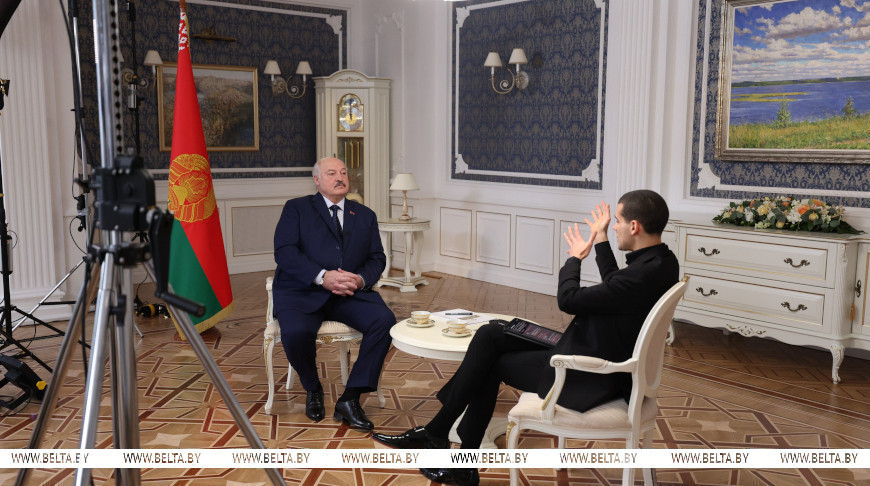
Belarusian President Aleksandr Lukashenko gave an interview to U.S. blogger Mario Nawfal in February 2025, but up to this day the Belarusian leader’s statements continue to be analyzed abroad, including amid the worsening trade relations between the USA and China, as well as the situation in Ukraine.
While the Western media are traditionally in a rage about the words of the president as he steamrolls the template narratives of liberal elites, the non-Western world - the world of the global majority – is willingly heeds the advice of the Belarusian leader and take it into account.
This week, The Guardian published an article about the impact Mario Nawfal and the politicians he interviews leaves on Western audiences. In a nutshell, The Guardian, the mouthpiece of Western liberal propaganda, is seriously concerned about the fact that an alternative viewpoint, free from Western narratives, can be broadcast through Mario Nawfal and platforms like X to an audience of millions.
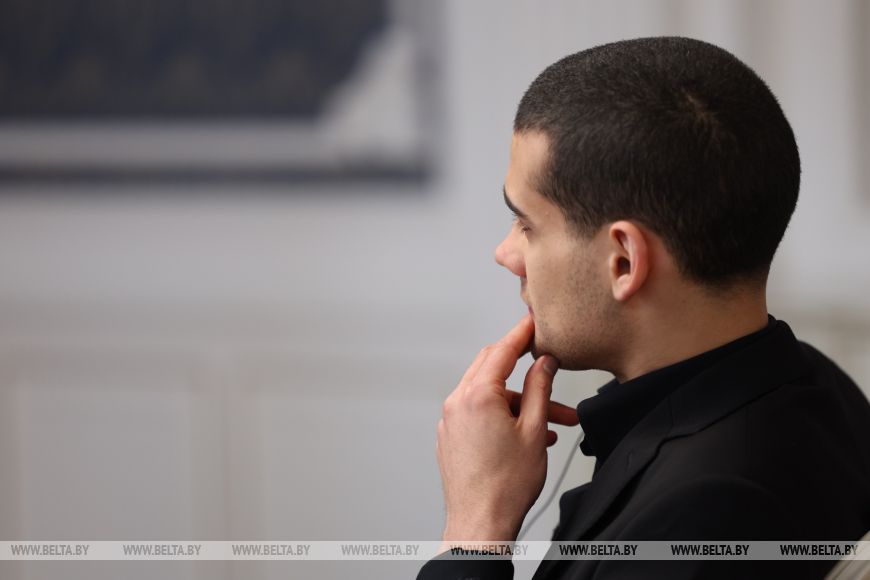
The Guardian's concern is understandable. For years, Western elites have been creating an illusory world, forcing their people to live by certain rules, think a certain way, and share certain values. Anything that didn't fit the pattern fell out of the category of “certain”, defied the established rules, was subject to isolation, abolition or complete destruction. Cracks that have been recently “splitting the world open” allow dissent to pour in together with the flow of fresh air.
“He has 2.1 million followers on X and was reported as one of the fastest-rising stars on Musk’s X platform in 2023 by NBC News,” The Guardian writes about Mario Nawfal.
Elon Musk, the owner of X, has more than 200 million followers. Any Musk’s social media posts immediately reach this huge number. “In the two-week span between 23 March and 3 April alone, Musk reposted or quote-tweeted Nawfal 28 times, including posts based on misinformation,” The Guardian writes.
By this “disinformation” it means any dissent that is rapidly eating away the walls of the Western world.
To explain to his audience why an alternative point of view is dangerous and harmful in a Western democracy, even though democracy is supposed to support pluralism of opinion, the author of the article uses the usual set of stamps and narratives. The logic is as follows: Russia is bad by default; everyone who has good relations with Russia is bad, too; Nawfal and Musk, who platform the “bad guys,” are even more evil than Russia and its allies combined.
The Guardian lists not only the president of Belarus as Moscow's ally, but also the leaders of Serbia, Slovakia, and even Romania's former presidential candidate whom Western "democracy" rejected as undesirable. Nawfal interviewed every one of them.
The Guardian author dwelt on Nawfal's sitdown with Lukashenko. "In Nawfal's interview with Lukashenko, the Belarusian president praised Trump and blamed the war in Ukraine on the west," the article said.
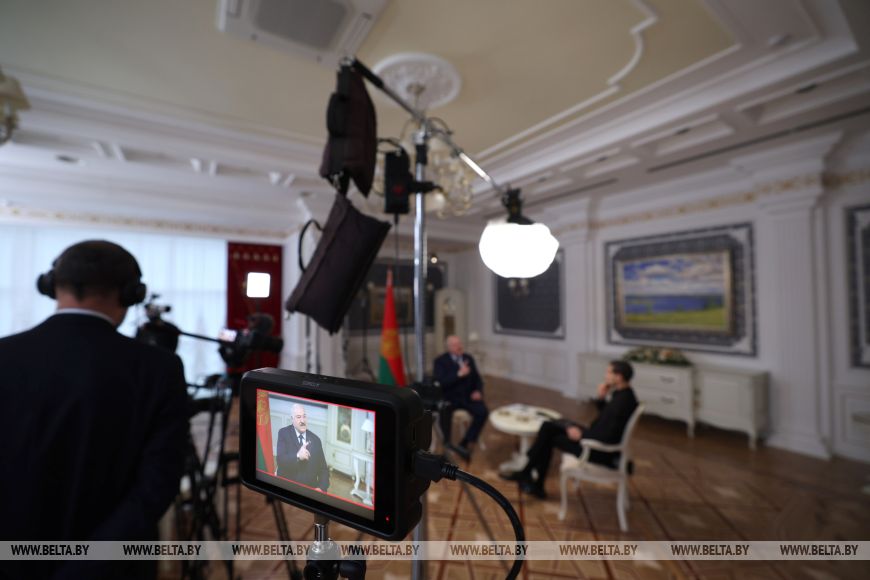
The article went on quoting Nawfal's own words said after the interview with the president of Belarus. “He does not just talk about peace. He genuinely wants it. It is almost personal. The most important thing is he wants peace,” Nawfal said about Lukashenko.
Yet, The Guardian is not interested in discussions about peace. For Western liberal elites and the media they supervise, the main thing on the agenda is the war on dissent, which they are trying to present as a confrontation with Russia. "For Russia’s purposes, these kinds of interviews not only provide a platform for recirculating propaganda claims about Russia as a defender of normal states, against western imperialism, globalists in Washington, Nazis in Ukraine, etc … but also provide access to wider audiences in the US and elsewhere through their social media channels," Paul Goode, a Russian studies professor at Carleton University, told The Guardian.
The fact that people like Nawfal or the American journalist Tucker Carlson have access to a wider audience and can broadcast alternative views is also a concern for Ian Garner, an assistant professor at the Pilecki Institute in Warsaw. "Ultimately, what all of this is about is propaganda, and it is using a very large online audience that somebody like Nawfal has to be able to speak directly to people all over the world," Garner said.
Remarkably, Nawfal even had to write a letter to The Guardian to explain to the newspaper's staff what free journalism is about. "My work involves publishing direct, unedited conversations with global figures, with the aim of promoting transparency and dialogue across ideological divides. Viewers are free to form their own conclusions," Nawfal said.
The blogger called his interviews "broader journalistic initiative to present all sides of key geopolitical issues – including perspectives often excluded from mainstream Western media".
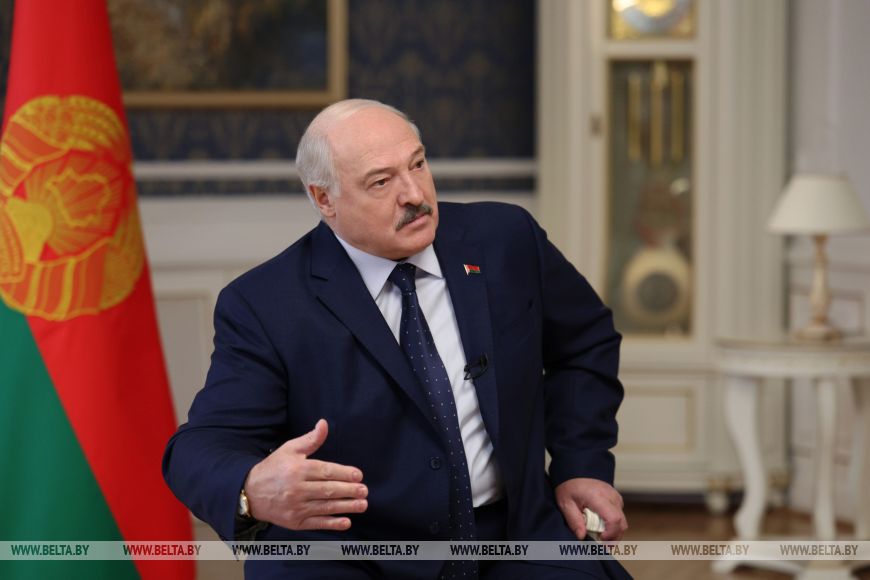
But while some exclude them, others pay serious attention to them. Thus, Chinese diplomat Zhang Heqing, having analyzed Lukashenko's interview with the American blogger, pointed to the Belarusian leader's wisdom and valuable perspective on resolving global conflicts and promoting international cooperation. The Chinese diplomat shared his opinion on the social network X.
"In a recent in-depth interview with American blogger Mario Naufal, Belarusian President Aleksandr Lukashenko offered profound insights on a range of global issues, demonstrating his wisdom and statesmanship. When addressing the Ukraine crisis, President Lukashenko expressed deep sorrow for the suffering of the people involved," Zhang Heqing wrote.
He noted that the Belarusian leader once maintained warm relations with Vladimir Zelensky. In the interview, Aleksandr Lukashenko mentioned that Zelensky, perhaps due to inexperience and external pressures, made decisions that led the country to the current situation
"He [Aleksandr Lukashenko] emphasized that the root causes of the conflict are multi-faceted and involve geopolitical, historical, and cultural elements, suggesting that a peaceful solution should be the top priority, and he even expressed his willingness to host peace talks to facilitate dialogue and negotiation," the diplomat noted.

Zhang Heqing also pointed out that in the interview with Mario Nawfal, the Belarusian leader touched upon the topic of Chinese-American relations. "President Lukashenko shared his unique perspective. Having closely observed China's development over the past three decades, he highly commended China's remarkable progress. He sincerely advised President Trump that instead of taking a confrontational approach, the United States should engage in constructive negotiations with China," Zhang Heqing noted.
The diplomat also mentioned Lukashenko's statement that any reckless attacks on China would be counterproductive. But reaching an agreement with China would be beneficial for the whole world.

The Chinese diplomat believes that Lukashenko's advice holds global significance. "This interview not only allowed the international community to better understand Belarus' stance on major international issues but also provided valuable thoughts and suggestions for resolving global conflicts and promoting international cooperation. President Lukashenko's words, full of reason and good-will, offered hope for a more peaceful and prosperous world," Zhang Heqing concluded.
It was interesting to see how differently the West and East can view the same things. While some see hope for peace in the words of the Belarusian president, others ponder how to strengthen their flanks in the information war. However, the West shows a diversity of opinions on this issue. In both political and expert circles of Western countries, there are many who understand that it is time to build bridges instead of walls. And Belarus, due to its geographical location and peaceful political course, can indeed become a bridge capable of connecting the West and the East.
Vita Khanataeva,
BelTA.





